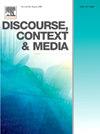Digital crossings: A case study of a knowledge mobilisation approach for translating research into practice
IF 3.1
2区 文学
Q1 COMMUNICATION
引用次数: 0
Abstract
There is increasing emphasis on the importance of knowledge mobilisation, also known as knowledge translation, knowledge exchange, knowledge transfer, so that research findings are moved into action by stakeholders such as policymakers, practitioners and the broader public. While disseminating one’s research digitally is a promising gateway for knowledge produced to have a greater reach, education researchers are least equipped to use digital methods, compared to other methods. Applying Bernstein’s (2000) concept of recontextualisation with a proposed KM framework, we examine how the discourses of research are selectively appropriated, relocated, refocused and related to the discourse of practice through the translational process in one case study of a project website featuring education research within the Singapore context. Principles for successful recontextualisation drawn from this case study include: (1) educated hunches about key ideas for practical translation, (2) familiarity with specific audience needs, (3) awareness of discourse rules for engagement through specific digital modes. This article contributes towards demonstrating the value and productivity of Bernstein’s (2000) recontextualisation on research via digital media to engage varied audiences beyond the academia. The article concludes with recommendations on the systemic support needed to help researchers build a repertoire of practice for the translational process with the ultimate goal of moving evidence into action.
数字交叉:将研究转化为实践的知识动员方法的案例研究
人们越来越强调知识动员的重要性,也被称为知识转化、知识交流、知识转移,以便研究成果被决策者、从业者和更广泛的公众等利益相关者转化为行动。虽然以数字方式传播一个人的研究成果是使所产生的知识更广泛传播的一个有希望的途径,但与其他方法相比,教育研究人员最不具备使用数字方法的能力。运用Bernstein(2000)提出的知识管理框架的重新语境化概念,我们在新加坡背景下的一个以教育研究为特色的项目网站的一个案例研究中,通过翻译过程,研究研究话语是如何被选择性地挪用、重新定位、重新聚焦并与实践话语相关的。从本案例研究中得出的成功再语境化的原则包括:(1)对实际翻译的关键思想有良好的预感;(2)熟悉特定的受众需求;(3)意识到通过特定的数字模式参与的话语规则。本文有助于展示伯恩斯坦(2000)通过数字媒体重新语境化研究的价值和生产力,以吸引学术界以外的各种受众。文章最后提出了系统支持的建议,以帮助研究人员为转化过程建立一个实践库,最终目标是将证据转化为行动。
本文章由计算机程序翻译,如有差异,请以英文原文为准。
求助全文
约1分钟内获得全文
求助全文

 求助内容:
求助内容: 应助结果提醒方式:
应助结果提醒方式:


